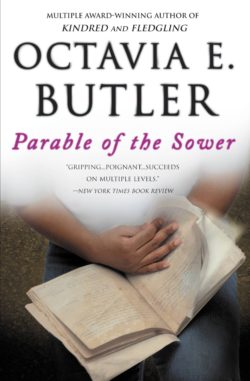 Before The Hunger Games, the Divergent Series, and The Maze Runner, there was the Parable of the Sower. Unlike today’s dystopian novels, where there is a contest to be won or a large looming government that manipulates its people for sport, Parable of the Sower is a story of survival. Written in 1993 and set in 2024, the novel lacks the technological devices (literary and otherwise) that we see in dystopian stories today, which is a feature I appreciate and prefer. There are no gadgets to get one out of a tight spot.
Before The Hunger Games, the Divergent Series, and The Maze Runner, there was the Parable of the Sower. Unlike today’s dystopian novels, where there is a contest to be won or a large looming government that manipulates its people for sport, Parable of the Sower is a story of survival. Written in 1993 and set in 2024, the novel lacks the technological devices (literary and otherwise) that we see in dystopian stories today, which is a feature I appreciate and prefer. There are no gadgets to get one out of a tight spot.
Lauren Olamina is the daughter of a preacher, but what she comes to believe about God, creation, and human nature is unique to her. The world she lives in isn’t compatible with her father’s faith, a world broken down by erratic climate and global economic upheaval. The dwindling family survives by banding together with others to stay alive outside the city of Los Angeles.
When a fire ravages their compound, Lauren is forced to pack up and head north. She has a feeling about it – which is important since she is a sharer, or one who lives with hyper-empathy, and follows her gut instinct at every move. Believing she has the answer that will rebuild society, a vision for Earthseed, she and a group of travelers walk to northern California to take a chance on a new life. The journey is not without loss.
Normally I’m not interested in dystopian stories. There is enough pain and frustration in our current time. Why borrow troubles from tomorrow?
Yet, among the noise of stories like The Hunger Games and The Maze Runner is a dystopian story that makes you pause. Even Station Eleven, which I loved, has an air of indulgence to it. It’s fiction, all the way, like the Handmaid’s Tale, which was written not long after Octavia Butler started the Earthseed series. So far-fetched it will never be.
Parable of the Sower is deeper than all of these stories. It’s raw and feels so real that I think, yes, we could do terrible things to each other in a state of panic.
How scary.
You should read it.

1 Comment
Comments are closed.